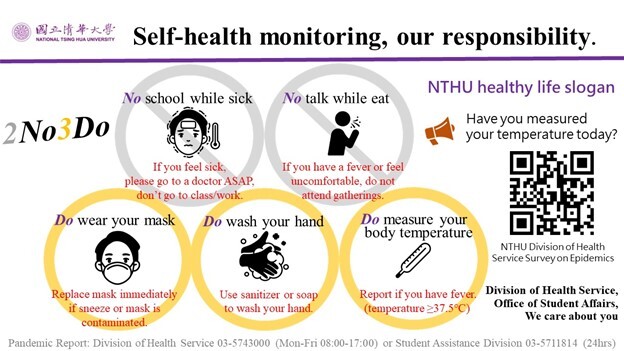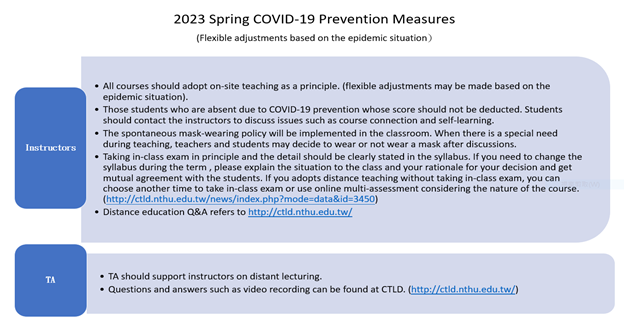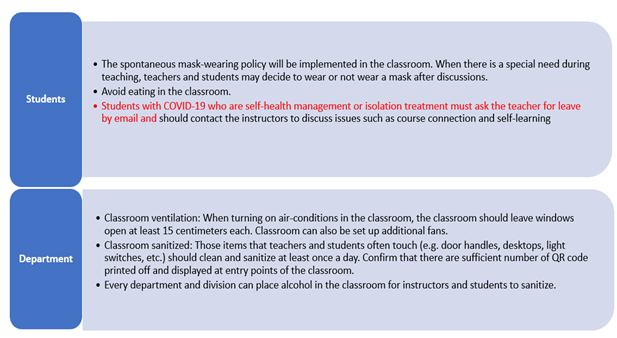NTHU Epidemic Prevention Guidelines (May 19 , 2023)
1. Self-health monitoring:
(1) Measure your body temperature and report immediately if the temperature is higher than 37.5 degrees.
(2) Keep your hands clean: Sanitize your hands.
(3) Wear a mask: Replace the mask immediately after sneezing or contamination.
(4) Do not go to class while you’re sick and go to a doctor as soon as possible.
(5) Do not talk while you’re eating: if you have a fever or feel uncomfortable, do not attend gatherings.

2. Effective since March 20th, mild COVID-19 cases exempt from isolation while moderate and severe cases will be required to report. The students and faculties who test positive with rapid tests should follow the guidelines appropriately (see attachment).
3. All access control within the school has been returned to normal.
4. Campus access control within the school has been returned to normal.
5. Campus restaurants:
Provide spray alcohol, hand sanitizer or hand washing equipment at the entrance.
6.Facility rental services: the requirement to wear masks throughout the outdoor group activities has been cancelled, the indoor group activities are allowed to wear masks independently, keep your hands clean.
7. Guest house 1 and Guest house Ching 10F:
(1) Online booking is open for both venues.
(2) The dining area of Guest House 1 is open for breakfast.
8. Please wear masks all the time in the following places including Division of Health Service, Center of Counseling Services, and Clinic of NTHU. Passengers taking the bus are advised to wear a mask.
9. All management teams of campus buildings should continue to clean and disinfect the building and maintain well ventilation in classrooms and other studying areas.
10. Student Dormitories:
(1) Visitors will need to register online. (Registration Regulation for Dormitory Visitor: https://sthousing.site.nthu.edu.tw/p/406-1254-210209.php?Lang=en)
(2) Sanitize shared areas daily.
(3) Cover the buttons or switches of water dispensers and lift buttons with protective films.
(4) Place hand sanitizers at the entrance of each dormitory. Install additional automatic thermal scanner at the administration office. Prepare individual thermometers for students.
(5) Place soaps on public wash basins for cleansing.
(6) Janitors should complete hygiene education training and conduct daily self-health management.
(7) People are free to decide whether to wear a mask in the dormitory.
(8) Students who have a fever (axillary temperature ≥37.5℃), respiratory symptoms, and other symptoms, please wear a mask and seek medical attention immediately or contact with Division of Health Service (03-574300, Monday to Friday 8:00-17:00) and Division of Student Assistance (03 -5711814, 24 hours) for follow-up care and tracking.
11.Sports Facilities:
(1) General regulations:
(a) Students do not need to wear a mask when engaging in sports during physical education classes. If they have symptoms , they should still wear a mask.
(b) Masks are not required in sports competitions, but reserve players wear a mask autonomously.
(c) Wear a mask autonomously in indoor sports venues.
(d) Epidemic prevention measures adjustments are available on the physical education office website according to the nationwide epidemic alert. (https://nthupeo.site.nthu.edu.tw/).
(e) Opening hours for the facilities can be found at http://nthupeo.site.nthu.edu.tw/p/412-1265-14409.php
(2) Swimming pool:
(a) Wear a mask autonomously in indoor sports venues , If they have symptoms, they should still wear a mask.
(b) IF you decides to wear a mask, seal your mask in a zipper bag and store it in the storage area before entering the pool.
(d) The children's pool and the second floor remain closed.
(3) Opening hours for the facilities in the Nanda campus can be found at http://nthupeo.site.nthu.edu.tw/p/412-1265-14409.php
12.Library:
(1) Wearing a mask is not mandatory. But respiratory symptoms are present, a mask is still needed.
(2) Please contact the library if you need to extend the due date, cancel items on hold, or eliminate the counting of overdue fine due to the pandemic.
(3) Library conducts environmental disinfection continually and provides hand sanitizers.
(4) Epidemic prevention measures adjustments are available on the library website according to the nationwide epidemic alert. (https://www.lib.nthu.edu.tw/news/2019nCov.html)
13. Courses:
(1) In general, all courses will be on-site (Flexible adjustments may be made based on the pandemic situation):
(a) The spontaneous mask-wearing policy will be implemented in the classroom. When there is a special need during teaching, teachers and students may decide to wear or not wear a mask after discussions. In addition, avoid eating in the classroom and sanitize hands properly.
(b) In principle, physical exam should be implemented. The details for grading should be clearly stated in the syllabus. If teachers need to change the syllabus during the term, please explain the situation and your rationales to the class to obtain mutual agreement with the students. If distance teaching is implemented and physical exams are impracticable, various online assessments can be implemented according to the nature of the course in addition to the physical examination, which can be scheduled when allowed. http://ctld.nthu.edu.tw/news/index.php?mode=data&id=3450
(c) Physical Education Classes:
Sharing sports equipment shall be avoided. If there is a need for sharing equipment, disinfection shall be carried out before sharing.
(d) Experimental and practical classes should be separated into groups and equipment must be disinfected.
(e) Performing arts courses:
Personal equipment (e.g. musical instruments, costumes) is required in general. Exclusive musical instrument (e.g. mouthpiece) is a necessary part which should be followed when playing the wind instruments. Sharing is not allowed. Microphones used in drama classes should be dedicated in this principle.
(f) Students with COVID-19 who are under self-health management or isolation treatment apply to these options:
i. Course Implementation Methods:Teachers are requested to provide remote learning—synchronous or non-synchronous (with the consent of the teacher, the teaching assistant will upload the video file to the University's digital learning platform within one week after the class, which is provided only for students to watch the course online), or arrange a teaching assistant to assist in a make-up class or supplementary study; students are also requested to take the initiative to communicate with the teacher and discuss issues such as course content and self-learning methods.
ii. Leave: Please request a leave by emailing the instructor. The absence will not cause the deduction of final score.
iii. Examination :Instructors can make flexible adjustments for students who are unable to attend classes or take exams due to the corona virus prevention such as make-up exam. The results of the make-up exam will be regarded as the formal exam result.
(2) Classroom precaution measures:
(a) Classroom ventilation: When turning on air-conditions in the classroom, the classroom should leave one window open for at least 15cm. Additional fans can also be added.
(b) Classroom sanitization: Items that teachers and students often touch (e.g. door handles, desktops, light switches, etc.) should always be cleaned and sanitized at least once a day.
(c) Every department and division can place diluted alcohol in the classroom for instructors and students to sanitize.
(3) CTLD’s website for online teaching info and online teaching equipment rental ( https://reurl.cc/l98jbv )


14. Student Club Activities:
Student clubs may hold face-to-face activities. The epidemic prevention measures for club activities should be implemented in accordance with the relevant regulations of the Ministry of Health and Welfare and the Ministry of Education.
15. Administrative Methods and Attendance Management:
(1) Each unit shall grasp the health situation of its employees and arrange the substitutes, and distinguish the assignments as "urgent", "non-urgent but still need to do business" and "non-urgent temporary business" and other business. (For the relevant disk list, please go to the Personnel Office website/epidemic prevention area for download.) https://person.site.nthu.edu.tw/p/405-1066-228186,c18254.php?Lang=zh-tw)
(2) If a history of contact with the confirmed patient exists, or have suspected COVID-19 symptoms or flu-like symptoms such as fever, respiratory symptoms, olfactory abnormalities, or unexplained diarrhea, please go to the doctor or screen as soon as possible, and do not go to the office. Ask colleagues to support and have appropriate leaves; apply for work from home depending on the nature of the business, the status of information equipment, and the allocation of manpower.
(3) If there is 1 person in the same unit or the same office space confirmed positive, it should be handled in the following way according to the actual situation of the epidemic: Participate in the provisions for leave of absence for the staff and workers of the university during the epidemic prevention period in response to serious special infectious pneumonia.
1. Mandatory quarantine, inspection (confirmed): take public to leave. (The first 7 days of public leave, the last 7 days of independent health management can apply for work from home or special leave, overtime compensation, and other leave.)
2. Home isolation (first 3 days of 3+4 or 7 days on 0+7): Please take quarantine leave. 5/17 people who have not completed 3 doses of vaccine can apply for quarantine leave in the first 3 days (supporting information such as Health Insurance Express APP vaccination record, and separation notice need to be attached).
3. Independent epidemic prevention (the last 4 days of 3+4): If you do not go to the school office, you can apply for work from home, and you can also ask for special leave, overtime, and other leave.
4. Independent health management: those with symptoms who do not go to the school office can apply for home office, and can also apply for special leave, overtime compensation, and other leave.
5. Self-response to high-risk persons/self-health monitoring: Within the first 3 days, the principle is not going to school or office, colleagues can apply for work from home during this period, and can also apply for special leave, overtime compensation, and other leave. If there is a fever, smell/taste abnormality, diarrhea, or respiratory symptoms after the first 3 days, you should take your own leave or apply for an extension of work from home. However, if one does not have the above symptoms, he should return to school and work.
(4) For work from home application, please fill in the "Application Form for Implementing Work From Home at National Tsing Hua University in Response to the Epidemic Situation", and after being approved by the supervisor of the first-level unit, send it to the personnel office for future reference. (Application form can be found at https://person.site.nthu.edu.tw/p/405-1066-206857,c18254.php?Lang=zh-tw)
(5) If there is a need to take care of their children, they can still apply for epidemic prevention and care leave (without pay).
(6) Subsequent administrative methods and attendance management will be revised in conjunction with the guidelines of the Epidemic Command Center.
16. Faculty and staff business trip: In cases of faculty and staff have to go abroad, alternative methods should be considered. In necessary or urgent cases, please ask the supervisors to carefully evaluate.
 Novel Coronavirus
Novel Coronavirus